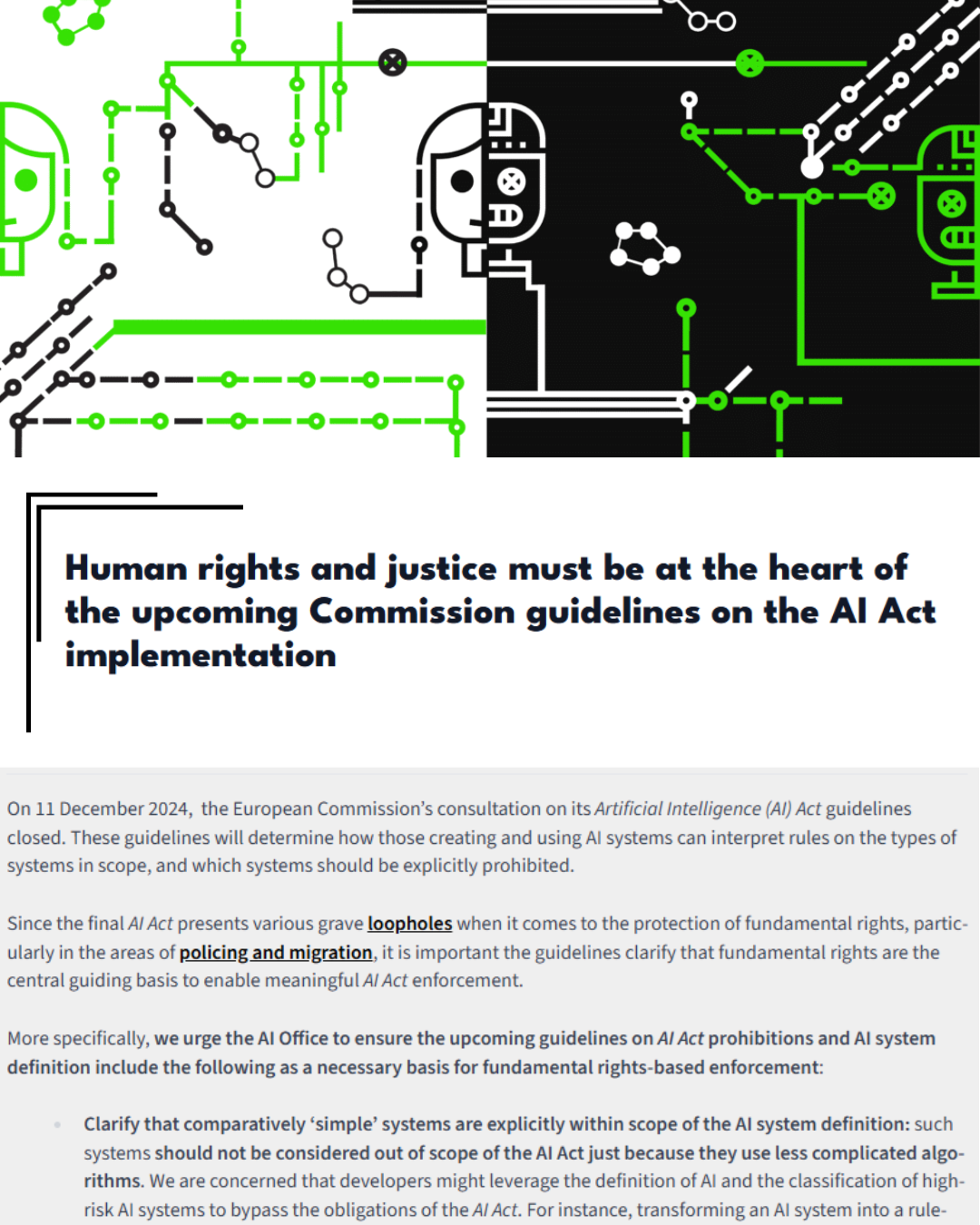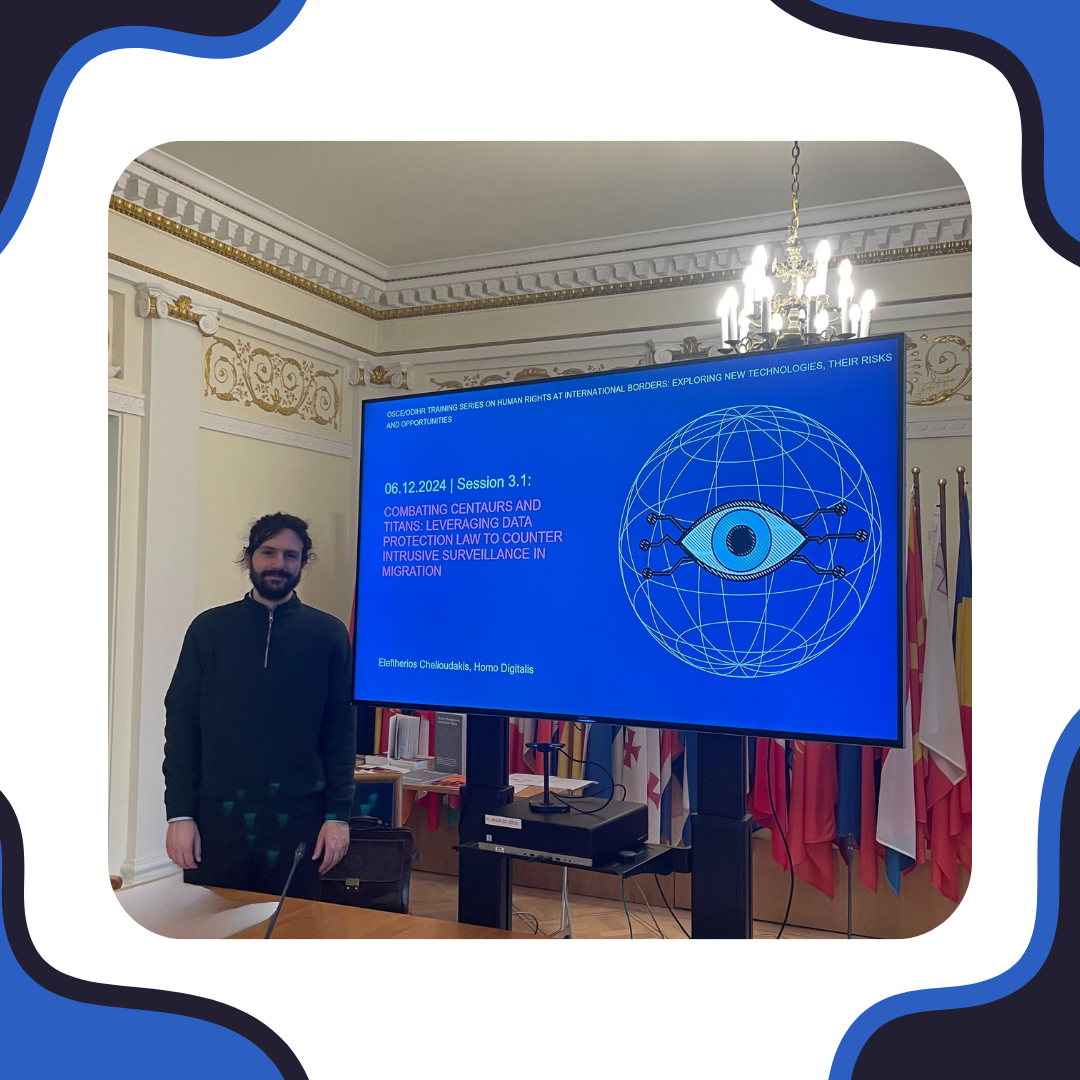Homo Digitalis Interview on ANT1's show "Your Business Can" with Fai Chrysοchoou
On Sunday, March 9, Homo Digitalis was featured on ANT1’s program “Your Business Can”, hosted by journalist Fai Chrysοchoou.
A huge thank you to the journalist and her team, including Toni Aravadinos, for the kind invitation and their interest in our work!
Key Discussion Points
Representing Homo Digitalis, Eleftherios Chelioudakis spoke about:
–Artificial Intelligence and its regulatory framework
–How legislation acts as a driver of innovation, trust, and entrepreneurship
The Reality of AI & Business Growth
Many non-EU tech companies have historically followed the “Move Fast and Break Things” model, leading to:
–Numerous violations & fines imposed by European regulators
–Social polarization and addiction to social media
–The spread of misinformation
Why Compliance is an Advantage
–Businesses that comply with regulations gain a competitive edge
–Strong legal foundations enable sustainable growth
-Compliance fosters trust, stability, and access to the unified digital market
Ultimately, legislation does not hinder business—it fuels long-term success and strengthens democratic societies!
We co-sign an CSO Open Letter on the proposed GDPR Procedural Regulation
As the trilateral negotiations at the EU level continue regarding the proposed regulation on additional procedural rules for the enforcement of the GDPR, we, together with European Digital Rights and 34 other Civil Society organizations, join our voices in an open letter to lawmakers!
We urge them to prioritize strong enforcement mechanisms that ensure individuals can effectively exercise their rights while highlighting the systemic weaknesses in the enforcement of GDPR provisions.
Read the open letter here.
We sign a common CSO statement for the AI Summit on the protection of environment
Ahead of the AI Action Summit in France, 100+ civil society organisations from around the world have an urgent message for governments and industry leaders: The environmental and human costs of AI are too high – we need action now.
Our 5 key demands:
-Phase out fossil fuels
-Bring computing within limits
-Ensure responsible supply chains
-Enable equitable participation
-Advance meaningful transparency It’s time for AI to be sustainable, just, and accountable.
You can read our full demands here.
You can co-sign our common statement here.
Statements from Homo Digitalis in an article by Reporters United, Investigate Europe & EfSyn on the AI Act
Following the investigation and related revelations carried out last week by Reporters United, Investigate Europe, and EfSyn regarding the trilateral meetings on the AI Act and the negative stance of the Greek government on the security safeguards for biometric identification at a later stage, today in a new report, journalist Εurydice Bersi highlights how various state bodies have been systematically violating for years the security safeguards that European data protection legislation provides for the artificial intelligence systems already in use in our country.
We sincerely thank the journalist for her interest in our related actions and for the opportunity to provide some brief comments on the challenges we have identified and the lack of compliance that has been evident over time. Our statements were represented by Eleftherios Chelioudakis.
In fact, as part of the journalists’ investigation, a request for access to information has already been submitted, calling on the Greek government to disclose the documents with its positions on the trilateral meetings!
You can read the related article and their detailed investigation here.
Open Letter to the President of the European Commission to Stand Up Against Big Tech Companies
Over 40 civil society organizations, across the EU and the US, have an urgent message for the European Commission and President Ursula von der Leyen. Now is the time to stand up to the bullying by Big Tech companies and their allies in the Trump administration.
Europe must commit to strong enforcement of the DSA, DMA regulations, and other digital laws to protect people, our democracy, and our economy!
Read our open letter here.
Homo Digitalis spoke at the World Economic Forum in Davos, Geneva.
Doing More With Less at Geneva Day in Davos: How to address growing needs in times of economic uncertainty?
We explored this crucial question on Monday 21/1 during a panel discussion held as part of Geneva Day at the House of Switzerland in Davos. We were proud to participate in this event co-organised by Swiss Financial Innovation Desk and the Permanent Mission of Switzerland to the United Nations in Geneva, during the World Economic Forum 2025.
This engaging discussion explored emerging technologies such as Artificial Intelligence (AI), Blockchain, and Central Bank Digital Currencies (CBDCs), combined with innovative fiscal policies, as tools to meet the critical challenges of tomorrow. Our president, Elpida Vamvaka, represented our team speaking about our important actions and victories in the field of AI in Greece, as well as the NGI – The Next Generation Internet NGI TALER project, building a new, privacy-preserving, secure electronic payment system based on open standards, free software, and advanced cryptography.
A heartfelt thank you to the organisers and the distinguished panelists Christoph König, Deputy State Secretary, State Secretariat for International Finance SIF, Kelly T. Clements,, Deputy High Commissioner at UNHCR, the UN Refugee Agency, Daniel Eidan, Advisor & Solution Architect at Bank for International Settlements – BIS Innovation Hub.
The amazing Eva Selamlar-Leuthold, Head of Swiss Financial Innovation Desk (FIND), moderated this particularly dynamic and insightful discussion in a unique manner.
We would also like to extend our warmest thanks to Jonas Pasquier, Head of Global Affairs at the Permanent Mission of Switzerland to the UN in Geneva, his entire team, the Mission, as well as the Presence Switzerland team at the House of Switzerland, for making this event a success.
Would you like to get more insights from this discussion. Stay tuned for an upcoming publication by the Swiss Financial Innovation Desk, here.
The President of Homo Digitalis, Elpida Vamvaka, is Invited to WEF at DAVOS: Recognition on a Global Stage
We are thrilled to announce that Homo Digitalis has been invited to participate in an esteemed panel discussion at DAVOS, organized by the Swiss Financial Innovation Desk (FIND) of the State Secretariat for International Finance and the Permanent Mission of Switzerland to the UN in Geneva in the context of the World Economic Forum (WEF).
Event Details:
Topic: Doing More with Less: How to Address Growing Needs in Times of Economic Uncertainty
Date & Time: Tuesday, January 21, 2025 | 17:00-18:30
Location: Crystal Lounge, Davos
Our President, Elpida Vamvaka, will join a distinguished panel of global leaders to discuss how emerging technologies such as Artificial Intelligence (AI), Blockchain, and Central Bank Digital Currencies (CBDCs) can empower governments and organizations to address critical global challenges in times of economic uncertainty. Specifically, in the panel hosting our President, Elpida Vamvaka will be also speaking:
– Christoph König, Deputy State Secretary, State Secretariat for International Finance
– Kelly Clements, United Nations Deputy High Commissioner for Refugees
– Morten Bech, Centre Head Switzerland, Bank for International Settlements (BIS) Innovation Hub
The moderator of the panel will be Eva Selamlar, Head of Swiss Financial Innovation Desk (FIND)
While we celebrate this global recognition, it underscores the need for similar trust and acknowledgment at the national level in Greece. Strengthening Greece’s commitment to technological innovation and policy foresight will pave the way for meaningful change.
You can find more details about the event here.
Let’s make human rights-oriented innovation the cornerstone of a brighter and more resilient future – for Greece and the world.
Joint Statement on the Upcoming European Commission Guidelines on Prohibited Practices of the AI Act
We are publishing a joint statement on the upcoming European Commission Guidelines on Prohibited Practices of the AI Act.
On December 11, 2024, the European Commission completed its public consultation on the interpretation of the definition of an AI system and on prohibited AI practices, in accordance with the provisions of Regulation 2024/1689 (AI Act). Homo Digitalis participated in the related process.
In the context of the issuance of the expected guidelines by the Commission, concerns remain about potential gaps that could jeopardize fundamental rights. For this reason, and together with more than 25 civil society organizations, academics, and other experts, we are issuing a statement today, urging the AI Office and the European Commission to ensure specific demands.
You can read our joint statement here.
Eleftherios Chelioudakis of Homo Digitalis as a Trainer in the 3rd OSCE ODIHR Training on Personal Data & Border Management
From December 4 to 6, Eleftherios Chelioudakis, our Co-founder and Executive Director, participated as a trainer in the third training session organized by the international organization OSCE, specifically its Office for Democratic Institutions and Human Rights (ODIHR) in Warsaw. The training explored the use of new technologies at international borders, as well as the risks and opportunities they pose for Human Rights.
In our five presentations, we focused on the technologies used at borders, the Human Rights impacted by these uses, the provisions of the GDPR and Directive 2016/680 LED, the significant decision by the Hellenic Data Protection Authority (HDPA) regarding the “KENTAYROS” and “YPERION” systems, as well as technical tools that human rights defenders can use in their work!
We extend our heartfelt thanks to the participants for their dynamic presence, to the team of outstanding trainers Nikola Kovačević, Djordje Alempijevic, and Arancha Garcia del Soto for their knowledge and expertise, and to the organizing team, Lola Girard and Veronica Grazzi, for their impeccable organization and contributions. It is a great honor for us to participate!
You can learn more here.








